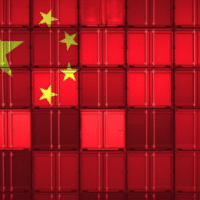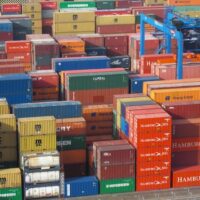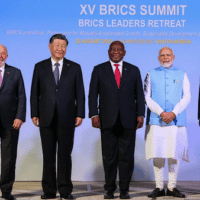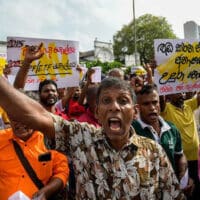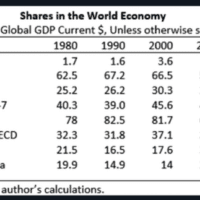-
Mali, Burkina Faso, and Niger withdraw from ECOWAS
Land area under ECOWAS, which is condemned by West Africa’s popular movements as an agent of French imperialism, has been reduced to less than half after their withdrawal.
-
Has China really reached the end of its economic boom?
China’s state sector still has a powerful ability to sustain investment and production.
-
A minimum-wage increase can benefit the whole economy
CounterSpin interview with Sebastian Martinez Hickey on minimum wage.
-
Paul Burkett, rest in power
In memory of Paul Burkett, Marxist scholar and jazz musician, 1956-2024.
-
Russia and China no longer using dollar in trade, claims Russian PM Mishustin
Western currencies have almost been completely phased out in Russia-China trade, as nearly all payments between the countries are now carried out in rubles and yuan, according to Russian Prime Minister Mikhail Mishustin.
-
Neo-Liberal falsehoods
The basic theme is to suggest that under neo-liberalism there has been such an acceleration of the growth rate of Gross Domestic Product that the people as a whole have become much better off, and vast masses of them have been lifted out of poverty (one particular enthusiast has even claimed that poverty now afflicts only 2 per cent of the population).
-
Pitfalls of export-led growth
THE wisdom of pursuing a strategy of export-led growth has been discussed among development economists for at least half a century, ever since the so-called East Asian “miracle” started to be contrasted with the comparatively sluggish growth experience of countries like India that were pursuing, in the World Bank’s language, an “inward looking” development strategy.
-
Cuba’s economists committed to Che’s example
On the eve of Economist’s Day, it is important to review some aspects of Che’s core ideas on the Political Economy of Socialism and especially when for some the solution to current problems is to completely free the market and reduce the role of the State in the economy.
-
Sam Bankman-Fried and the moral abyss of the market
“There will probably never be anything I can do to make my lifetime impact net positive”, Sam Bankman-Fried wrote in his diary after the collapse of his cryptocurrency company FTX.
-
How could a BRICS+ bank and settlement currency work? Economist Michael Hudson explains
Economist Michael Hudson details how BRICS could create a mutual settlement currency for payment imbalances among central banks and build an alternative to the financialized neoliberal model of the dollar/NATO bloc.
-
U.S. Academic Steve Ellner: ‘Venezuela needs more checks and balances to fight corruption and abuse of power’
Orinoco Tribune interviewed U.S. academic Steve Ellner on different issues, ranging from Venezuelan domestic issues to global matters.
-
Sri Lanka’s dangerous domestic debt restructuring
The recent bailout agreement between the International Monetary Fund and Sri Lanka fails to address the economy’s structural problems. Instead, it focuses on highly regressive measures that disproportionately affect the working poor and are likely to exacerbate the country’s ongoing debt distress.
-
Behind BRICS expansion
AT the Johannesburg summit of the BRICS countries, it was decided to expand the group beyond its original five, namely, Brazil, Russia, India, China and South Africa, to include six more countries.
-
The news is full of headlines about ‘China’s economic collapse’ — ignore them
Once again, the Western media Establishment, and sadly some on the left, are talking up an impending economic disaster in China, when the truth is quite the opposite, argues JOHN ROSS.
-
Alienation under capitalism and the conspiracy pipeline
When class analysis is absent from discussions about systemic problems, issues like income inequality, access to resources, and power imbalances are often oversimplified or ignored.
-
Third World external debt in the light of simple economics
INDIA and other third world countries can morally justify their being a part of G-20 alongside the imperialist powers, only if they raise common and pressing problems of the third world as a whole at G-20 meetings.
-
The idea of degrowth communism was Marx’s last breakthrough—and perhaps most important
Even if Japanese Marxist Kohei Saito had not written Marx in the Anthropocene: Towards the Idea of Degrowth Communism, the left today would still need to take the idea of degrowth seriously. This is because, economist and anthropologist Jason Hickel explains, “while it’s possible to transition to 100 percent renewable energy, we cannot do it fast enough to stay under 1.5°C or 2°C if we continue to grow the global economy at existing rates.”
-
Pitfalls of export-led growth
AFTER Sri Lanka and Pakistan, Bangladesh has become the third country in our neighbourhood to become afflicted by a serious economic crisis.
-
Modern supply-side economics and the New Washington Consensus
Last month, the U.S. National Security Advisor, Jake Sullivan, outlined the international economic policy of the U.S. administration. This was a pivotal speech, because Sullivan explained what is called the New Washington Consensus on U.S. foreign policy.
-
Ex-CIA advisor predicts date when U.S. dollar hegemony will collapse
The collective push to replace the U.S. dollar as the world reserve currency has much to do with Washington’s “weaponization of the dollar through the use of sanctions.”


